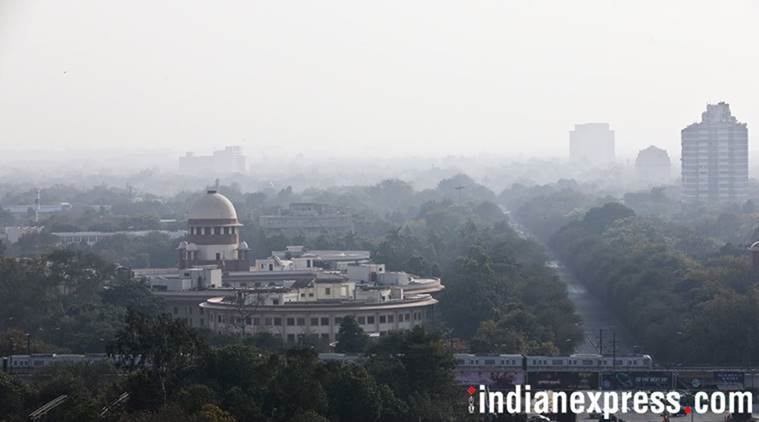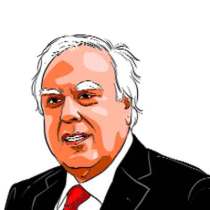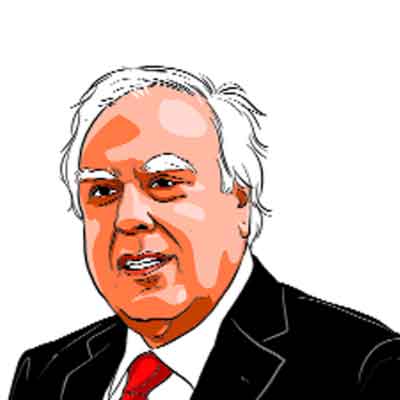The quality of justice
Justice Gogoi is right. The union of judiciary with executive is the greatest danger to democracy

The union of the judiciary with the executive is the greatest danger to democracy, writes Kapil Sibal (Express Photo)
An independent fearless judiciary is the leitmotif that protects constitutional values. Without it, the Constitution will be a dead letter, a body without a soul. In dispensing justice in accordance with law, the court polices executive excesses and strikes down legislative misdemeanours. Its vigilance and proactive role in protecting citizens’ fundamental rights is a warning to those who seek to subvert the values underpinning our Constitution. Without such vigilance, the nation will lose its democratic vitality. It is therefore not only incumbent for judges to zealously protect the independence and integrity of the court from within but for us all to protect it from without.
It is refreshing to hear a judge thoughtfully articulate both his vision and his understanding of Indian democracy’s predicament as our nation grapples with the challenges it faces today. This sane voice will echo in our ears for years to come.
It is refreshing to hear a judge thoughtfully articulate both his vision and his understanding of Indian democracy’s predicament as our nation grapples with the challenges it faces today. This sane voice will echo in our ears for years to come.
We will be in safe hands when we have a caravan of judges qua whom there are no stories to tell. Judges who, as Justice Ranjan Gogoi rightly said while delivering the third Ramnath Goenka Memorial Lecture in the capital last week, “attempt at infallibility instead of being satisfied with the finality of their judgements”. But infallibility is an ideal. Though all of us are fallible, this ideal is worth pursuing. Justice as a concept in a democracy is the amalgamation of the ideals of liberty, equality and fraternity. Equity is fundamental to a just society. The state must ensure that these ideals are translated on the ground in the everyday lives of people.
The two Indias that we live in are far removed from each other. One that is the creamy layer, living in isolation. The other India uncared for, desolate, living in abject poverty. The other is robbed of the necessary means to ensure an existence consistent with basic human dignity. Justice, as an ideal, needs to bridge this gap. While judges of the Supreme Court wax eloquent of the ideals of our Constitution by rendering epochal judgments, when witness to those ideals being transgressed through palpably unjust orders, they hesitate to act. While privacy is now a fundamental right with the judiciary playing on the front foot, we are all aware that the right is a chimera when it comes to the state acting in concert with enforcement agencies. That right is violated daily on social media platforms. True that the Supreme Court in striking down Section 66A of the Information Technology Act, 2000 (Shreya Singhal) took the legacy of free speech ahead by embracing “the constitutional precept of plurality of thought, diversity of opinion and the ethos of democracy in the tech-age and in the context of online speech”. Yet, every day those who post uncharitable remarks against our political leaders are dealt with by the state. Now social media platforms allow for inciting violence through morphed images, spreading fake news and rumour-mongering to incite communal disharmony and attacking sensibilities unheard of in any civilised discourse. These instances represent the gap between the ideal and the reality on the ground. The state chooses to turn a blind eye and judges merely end up watching the wild west. The two Indias Justice Gogoi talked about are difficult to bridge. Free speech, passionately protected by the court, stands trivialised. That is why Justice Gogoi rightly said that what India needs are not just noisy but independent journalists. If, far removed from journalistic ethics, those of the Fourth Estate required to defend our constitutional values become noisy collaborators both with state and non-state actors, democracy is truly in danger.
The reference to Alexander Hamilton’s fear that the greatest danger to democracy is the union of the judiciary with either of the other two branches of the state, was in the context of the separation of powers being a constitutional imperative. In a parliamentary form of government, the executive and the majority in the legislature are in concert. The union of the judiciary with the executive is the greatest danger to democracy. That union, some fear, can happen when the concept of finality of judgements gives protection to the injustices and excesses that need to be tested on the principle of infallibility.
That political democracy thus far has failed to deliver justice to millions is an undisputed fact. Our country is obsessed with issues which have nothing to do with concepts of societal equity. The debate on religion polarising communities, violence against those who practise a certain vocation, silence when the political class needs to be heard, are far removed from the fundamental issues of development. The judiciary has in the past given space to the voiceless and through public interest litigation made valiant attempts to redress grievances when the state chooses not to act. But the nature of public interest litigation has changed. Very often this instrument for delivering justice to the unrepresented and marginalised is used for partisan ends to protect those who have perpetrated injustice.
There is another aspect that needs to the addressed, which makes the judiciary within our democratic framework a unique institution. Processes of government are non-transparent. What happens within the corridors of power, the motivations behind decisions, cannot be fathomed despite the Right to Information Act, 2005. Legislative enactments are occasionally the result of motivated mindsets, seeking political capital. The processes of courts, however, are open and transparent. This is both a boon as well as a danger. It is a boon because those in court and outside are aware of the facts as disclosed and admire a judicial verdict delivered on the premise of infallibility. That helps keep the delivery of justice uncontaminated. The process is dangerous because the public gets to know when the constitutional premise of finality is sought to be given primacy over infallibility. Judges, therefore, when they deliver justice through a transparent process, do so under a million watchful eyes. Therefore, when injustice is perceived to be done, it leaves a scar. The judicial family needs to be sensitive to this issue.
It has been rightly pointed out by Justice Gogoi by referring to George Orwell’s 1984 that “Freedom is the freedom to say that two plus two make four”. Sometimes, we fear that two plus two does not make four. That is the worry.
The writer, a senior Congress leader, is a former Union minister
For all the latest Opinion News, download Indian Express App
More From Kapil Sibal
- Choreography of a break-upIt was scripted into coming together of BJP with PDP. In run-up to 2019, polarised J&K will add fuel to BJP fire...
- His choice, his misstepPranab Mukherjee’s decision to address RSS meet in Nagpur need not perturb the Congress. He did not go there as a representative of the party...
- What a governor must doKapil Sibal writes: Supreme Court must now address itself to protecting the institution from political machinations...








































No hay comentarios:
Publicar un comentario